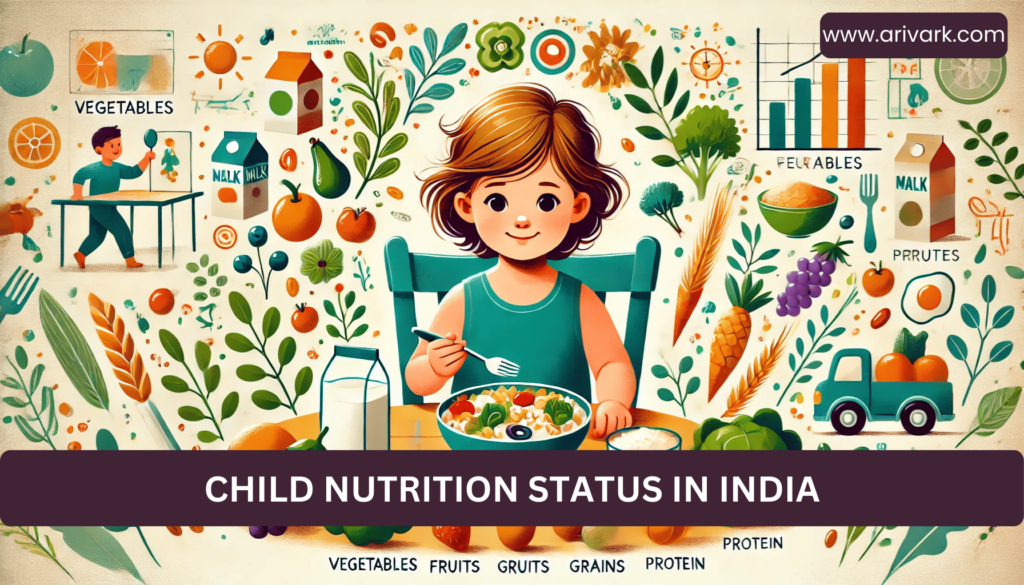Child Nutrition Status in India
- Current Statistics
- 38.9% of children under 5 years are stunted.
- 17% of children under 5 years are underweight.
- 5.2% of children under 5 years are severely wasted.
- Data Collection
- Data collected through the Poshan app.
- 7.54 crore children’s data analyzed.
- For children under 6 years:
- Total population: 16.1 crore (2021).
- 8.82 crore registered in Anganwadis.
- 8.35 crore data collected.
- 37% of children are severely wasted and underweight.
- 17% are underweight.
- Global Context
- WHO data indicates global under-5 mortality reduced from 50 lakh (1990s) to 23 lakh (2022).
Traditional Child Care Practices in India
- Prenatal Care
- Emphasis on maternal nutrition during pregnancy.
- Postnatal Care
- Focus on breastfeeding practices.
- Provision of age-appropriate nutritious food.
- Special attention to the health and nutrition of lactating mothers.
- Child Health Monitoring
- Regular growth monitoring.
- Observing dental health.
- Skin health and hygiene practices, including head shaving.
- Sleep and Sensory Development
- Emphasis on 13 hours of sleep for proper growth.
- Use of cradles in dimly lit areas.
- Sensory stimulation through toys and interactions.
- Physical Development
- Encouragement of crawling, walking, and other motor skills.
Government Initiatives
- Anganwadi Centers
- Monitor maternal and child health.
- Provide nutritional supplements.
- Ensure timely vaccinations.
- Primary Health Centers
- Conduct regular check-ups for mothers and children.
- Organize vaccination programs.
- Monitor mothers’ weight.
Challenges and Recommendations
- Economic Disparity
- Economically weaker sections face difficulty in following all recommended practices.
- Government Priority
- Continued focus on mother-child care through Anganwadis and PHCs is necessary.
- Social Responsibility
- Society needs to adopt healthy child-rearing practices.
இந்தியாவில் குழந்தைகளின் ஊட்டச்சத்து நிலை
- தற்போதைய புள்ளிவிவரங்கள்
- 5 வயதுக்குட்பட்ட குழந்தைகளில் 38.9% வளர்ச்சி குன்றியவர்கள்.
- 5 வயதுக்குட்பட்ட குழந்தைகளில் 17% எடை குறைந்தவர்கள்.
- 5 வயதுக்குட்பட்ட குழந்தைகளில் 5.2% மிகவும் மெலிந்தவர்கள்.
- தரவு சேகரிப்பு
- போஷண் செயலி மூலம் தரவு சேகரிப்பு.
- 7.54 கோடி குழந்தைகளின் தரவு பகுப்பாய்வு செய்யப்பட்டது.
- 6 வயதுக்குட்பட்ட குழந்தைகளுக்கு:
- மொத்த எண்ணிக்கை: 16.1 கோடி (2021).
- 8.82 கோடி அங்கன்வாடிகளில் பதிவு செய்யப்பட்டுள்ளனர்.
- 8.35 கோடி குழந்தைகளின் தரவு சேகரிக்கப்பட்டுள்ளது.
- 37% மிகவும் மெலிந்து எடை குறைந்தவர்கள்.
- 17% எடை குறைந்தவர்கள்.
- உலகளாவிய சூழல்
- WHO தரவின்படி, உலகளவில் 5 வயதுக்குட்பட்ட குழந்தைகளின் இறப்பு 50 லட்சத்திலிருந்து (1990கள்) 23 லட்சமாக (2022) குறைந்துள்ளது.
இந்தியாவில் பாரம்பரிய குழந்தை பராமரிப்பு முறைகள்
- கர்ப்பகால பராமரிப்பு
- கர்ப்பிணிகளின் ஊட்டச்சத்தில் முக்கிய கவனம் செலுத்துதல்.
- பிரசவத்திற்கு பிந்தைய பராமரிப்பு
- தாய்ப்பால் ஊட்டம்.
- வயதிற்கேற்ற ஊட்டச்சத்து உணவுகள் வழங்கல்.
- பாலூட்டும் தாய்மார்களின் உடல்நலன் மற்றும் ஊட்டச்சத்தில் சிறப்பு கவனம்.
- குழந்தை உடல்நல கண்காணிப்பு
- தொடர் வளர்ச்சி கண்காணிப்பு.
- பற்களின் ஆரோக்கியம் கவனித்தல்.
- தோல் ஆரோக்கியம் மற்றும் சுகாதார பழக்கங்கள் (மொட்டையடித்தல் போன்றவை).
- உறக்கம் மற்றும் புலன் வளர்ச்சி
- சரியான வளர்ச்சிக்கு 13 மணிநேர உறக்கம் வலியுறுத்தல்.
- குறைந்த வெளிச்சமுள்ள இடங்களில் தொட்டில் பயன்படுத்துதல்.
- விளையாட்டுப் பொருட்கள் மற்றும் தொடர்புகள் மூலம் புலன் தூண்டுதல்.
- உடல் வளர்ச்சி
- தவழுதல், நடத்தல் மற்றும் பிற உடல் திறன்களை ஊக்குவித்தல்.
அரசு முன்முயற்சிகள்
- அங்கன்வாடி மையங்கள்
- தாய் மற்றும் குழந்தை ஆரோக்கியம் கண்காணிப்பு.
- ஊட்டச்சத்து நிரப்பிகள் வழங்கல்.
- உரிய நேரத்தில் தடுப்பூசிகள் உறுதிப்படுத்தல்.
- ஆரம்ப சுகாதார நிலையங்கள்
- தாய்மார்கள் மற்றும் குழந்தைகளுக்கு வழக்கமான பரிசோதனைகள்.
- தடுப்பூசி திட்டங்கள் நடத்தல்.
- தாய்மார்களின் எடை கண்காணிப்பு.
சவால்கள் மற்றும் பரிந்துரைகள்
- பொருளாதார ஏற்றத்தாழ்வு
- பொருளாதார ரீதியாக பின்தங்கியவர்களுக்கு அனைத்து நடைமுறைகளையும் பின்பற்றுவதில் சிரமம்.
- அரசின் முன்னுரிமை
- அங்கன்வாடிகள் மற்றும் ஆரம்ப சுகாதார நிலையங்கள் மூலம் தாய்-சேய் பராமரிப்பில் தொடர்ந்த கவனம்.
- சமூகப் பொறுப்பு
- ஆரோக்கியமான குழந்தை வளர்ப்பு முறைகளை சமூகம் ஏற்றுக்கொள்ள வேண்டிய தேவை.
ArivArk Academy’s Social Media Handles
Official Website: www.arivark.com
Join our Telegram Channel: https://telegram.oia.bio/ArivArk
Youtube channel: https://www.youtube.com/stayupdatedtnpsc
Instagram Account: https://www.instagram.com/sandhiyaamani/?hl=en
Download our Mobile App from Play Store
Android: http://bit.ly/tnpscexampreparation
iOS: http://bit.ly/tnpsciosapp (Organization code: ZVHPT)
Laptop/PC: https://courses.arivark.com (Organization code: ZVHPT)
________________________________________
ONGOING BATCHES:
| Course Name | Full Details |
|---|---|
| TNPSC Elite Batch – Daily Live Zoom Class (6 Months – GS Completion) | Click Here |
| TNPSC Vision Batch – 180 Days Plan (GS Alone) | Click Here |
| TNPSC Vision Batch – General English | Click Here |
| TNPSC Vision Batch – General Tamil | Click Here |
| TNPSC Group 1 Preliminary Ignite Test Series 2025 | Click Here |
| TNPSC Group 1 Mains Ignite Test Series 2025 | Click Here |




